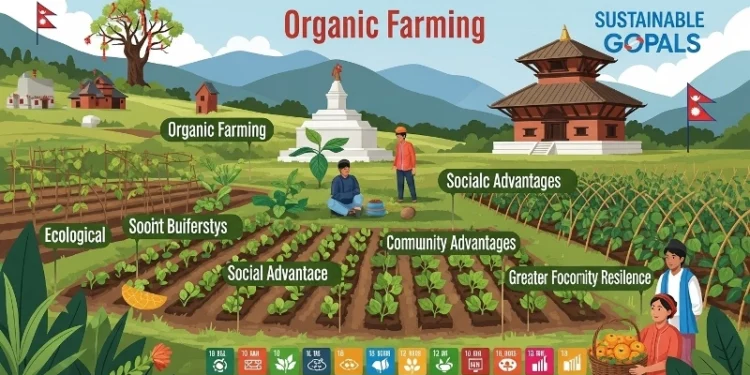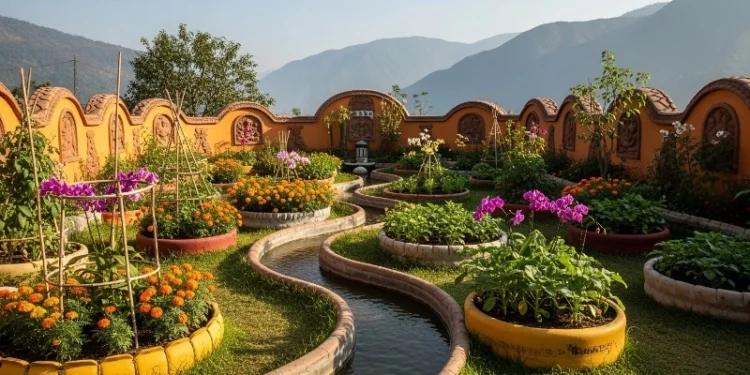Organic gardening is becoming increasingly popular in Nepal. As people seek healthier lifestyles and sustainable farming practices, organic gardening offers numerous benefits for individuals, communities, and the environment.

This blog post explores the various advantages of organic gardening in Nepal, focusing on its positive impacts on health, biodiversity, soil quality, and the economy.
1.Understanding Organic Gardening
What is Organic Gardening?
Organic gardening is a method of growing plants without synthetic fertilizers, pesticides, or genetically modified organisms (GMOs).
It relies on natural processes and materials to cultivate healthy plants and produce highquality food. Organic gardening emphasizes biodiversity, sustainability, and the health of the ecosystem.
Principles of Organic Gardening
The key principles of organic gardening include:
Soil Health: Organic gardeners focus on improving soil quality through composting, mulching, and crop rotation. Healthy soil is vital for healthy plants.
Biodiversity: Organic gardening promotes a variety of plants, which helps attract beneficial insects and enhances the resilience of the garden.
Natural Pest Control: Instead of using chemical pesticides, organic gardeners use natural methods to control pests, such as introducing beneficial insects or using organic repellents.
Sustainability: Organic gardening practices aim to be sustainable, ensuring that resources are used efficiently and that the environment is protected for future generations.
Organic Gardening in Nepal
In Nepal, organic gardening is gaining traction as people become more aware of the health risks associated with chemical fertilizers and pesticides. The diverse climate and rich agricultural heritage make Nepal an ideal place for organic practices. Farmers and home gardeners are increasingly adopting organic methods to grow fruits, vegetables, and herbs, contributing to the growing demand for organic produce in local and international markets.
2.Health Benefits of Organic Gardening
Nutritional Value of Organic Produce
One of the most significant benefits of organic gardening is the increased nutritional value of the produce. Organic fruits and vegetables are often richer in vitamins, minerals, and antioxidants compared to conventionally grown ones. Studies have shown that organic produce contains higher levels of certain nutrients, including vitamin C, iron, and magnesium.
Reduced Chemical Exposure
Organic gardening eliminates the use of synthetic pesticides and fertilizers, reducing the risk of chemical exposure for gardeners and consumers. This is particularly important in a country like Nepal, where many people rely on homegrown produce for their daily nutrition. By growing food organically, you can enjoy fresh, chemicalfree fruits and vegetables, promoting better health and wellbeing.
Improved Mental Health
Gardening, in general, has been linked to improved mental health. Engaging in organic gardening provides a sense of accomplishment and reduces stress. The act of nurturing plants and watching them grow can boost mood and promote relaxation. In a fastpaced world, spending time in a garden can serve as a form of therapy, helping individuals connect with nature and themselves.
Conclusion
The health benefits of organic gardening are numerous. By growing your own organic produce, you can enjoy nutrientrich food, minimize chemical exposure, and enhance your overall wellbeing. As more people in Nepal turn to organic practices, the potential for improved public health increases.
3.Environmental Benefits of Organic Gardening
Soil Conservation
Organic gardening contributes to soil conservation and health. By avoiding chemical fertilizers, organic gardeners promote the natural fertility of the soil. Practices such as composting, mulching, and crop rotation enhance soil structure, prevent erosion, and increase moisture retention. Healthy soil supports diverse microbial life, essential for nutrient cycling and plant growth.
Biodiversity Preservation
Organic gardening supports biodiversity by encouraging a variety of plants and animals to thrive. Diverse ecosystems are more resilient to pests, diseases, and environmental changes. By planting various crops and flowers, organic gardeners attract beneficial insects such as bees, butterflies, and ladybugs, which help pollinate plants and control pest populations.
Reduced Pollution
Chemical fertilizers and pesticides can contribute to soil and water pollution. When it rains, these chemicals can leach into waterways, harming aquatic life and affecting drinking water sources. Organic gardening eliminates the use of these harmful substances, reducing pollution and protecting the environment. This is especially crucial in Nepal, where many communities rely on natural water sources.
Climate Change Mitigation
Organic gardening practices can help mitigate climate change by sequestering carbon in the soil. Healthy soils are better at capturing carbon dioxide, reducing greenhouse gas emissions. Additionally, organic gardening promotes sustainable land use practices that help combat the effects of climate change, making it a vital component of environmental conservation efforts in Nepal.
Conclusion
The environmental benefits of organic gardening are significant. By preserving soil health, promoting biodiversity, and reducing pollution, organic gardening contributes to a healthier planet. In Nepal, where agriculture plays a critical role in the economy and the environment, adopting organic practices can have farreaching positive effects.
4.Economic Benefits of Organic Gardening
Increased Market Demand for Organic Products
The demand for organic produce is growing in Nepal, both locally and internationally. As consumers become more healthconscious, they seek fresh, chemicalfree food. Organic gardening can be a lucrative venture for farmers and home gardeners, providing them with access to a growing market.
Higher Profit Margins
Organic produce often fetches higher prices than conventionally grown food. Farmers who adopt organic practices can benefit from premium pricing, increasing their profit margins. This is particularly beneficial for smallscale farmers in Nepal, who can gain financial stability by selling organic products directly to consumers or through local markets.
Job Creation
The rise of organic gardening can lead to job creation in various sectors, including farming, processing, and retail. As the demand for organic products grows, more people will be needed to cultivate, harvest, and sell these items. This can help improve the livelihoods of many families in rural areas of Nepal.
Empowering Local Communities
Organic gardening promotes selfsufficiency and empowers local communities. By growing their own food, families can reduce their dependence on external sources and ensure they have access to fresh produce. This not only enhances food security but also fosters a sense of community as people share knowledge and resources related to organic gardening.
Conclusion
The economic benefits of organic gardening in Nepal are substantial. With increased market demand, higher profit margins, and job creation, organic gardening can contribute to the overall economic development of the country. By adopting organic practices, farmers and home gardeners can improve their livelihoods while supporting their communities.
5.Social Benefits of Organic Gardening
Strengthening Community Bonds
Organic gardening encourages collaboration and community involvement. Community gardens, where neighbors come together to grow food, foster social connections and strengthen relationships. These gardens serve as gathering places for people to share knowledge, resources, and experiences, promoting a sense of belonging.
Education and Awareness
Organic gardening provides an opportunity for education and awareness about sustainable practices. Workshops, training programs, and community events can educate people about the benefits of organic gardening, proper techniques, and environmental conservation. This knowledge empowers individuals to make informed choices about their food and gardening practices.
Encouraging Healthy Lifestyles
Engaging in organic gardening promotes healthy lifestyles by encouraging physical activity and providing access to fresh, nutritious food. Gardening requires physical labor, which can improve fitness levels and overall wellbeing. Moreover, growing and consuming organic produce can lead to healthier eating habits, reducing the risk of dietrelated diseases.
Preserving Cultural Heritage
In Nepal, traditional agricultural practices are an integral part of the cultural heritage. Organic gardening helps preserve these practices by promoting local crop varieties and traditional farming techniques. This connection to the land and cultural history is vital for maintaining identity and heritage.
Conclusion
The social benefits of organic gardening are profound. By strengthening community bonds, promoting education, encouraging healthy lifestyles, and preserving cultural heritage, organic gardening plays a significant role in enhancing the quality of life for individuals and communities in Nepal.
6.Getting Started with Organic Gardening
Assessing Your Space
Before starting an organic garden, assess the available space. Whether you have a large backyard or a small balcony, you can create an organic garden. Consider factors like sunlight, soil quality, and accessibility when planning your garden layout.
Choosing the Right Plants
Select plants that are wellsuited to your climate and soil conditions. In Nepal, popular choices for organic gardening include tomatoes, spinach, carrots, radishes, and various herbs. Research the best varieties for your region to ensure successful growth.
Soil Preparation
Healthy soil is the foundation of a successful organic garden. Begin by testing the soil to determine its pH and nutrient levels. Amend the soil with organic matter, such as compost, to improve fertility and structure. This will provide your plants with the nutrients they need to thrive.
Implementing Sustainable Practices
Incorporate sustainable practices into your gardening routine. Use organic fertilizers, such as compost or wellrotted manure, and implement natural pest control methods. Consider crop rotation and companion planting to enhance soil health and deter pests.
Conclusion
Getting started with organic gardening is a rewarding journey that offers numerous benefits. By assessing your space, choosing the right plants, preparing the soil, and implementing sustainable practices, you can create a thriving organic garden in Nepal.
7.Challenges of Organic Gardening in Nepal
Pest Management
One of the challenges of organic gardening is managing pests naturally. While organic methods can be effective, they may require more time and effort compared to chemical treatments. Learning to identify pests and using natural predators or organic repellents is essential for maintaining a healthy garden.
Soil Quality Issues
In some areas of Nepal, soil quality may be a concern. Poor soil conditions can hinder plant growth and reduce yields. Investing in soil improvement techniques, such as composting and mulching, can help overcome these challenges.
Climate Variability
Nepal’s diverse climate can pose challenges for organic gardeners. Seasonal changes and unpredictable weather patterns may affect crop growth and pest populations. It’s important to stay informed about local weather conditions and adapt gardening practices accordingly.
Limited Access to Resources
In rural areas of Nepal, access to organic gardening resources, such as seeds, tools, and organic fertilizers, may be limited. This can hinder the growth of organic gardening practices. Collaborating with local agricultural cooperatives or joining community gardening groups can help mitigate this challenge by sharing resources and knowledge.
Market Access for Organic Produce
While the demand for organic produce is growing, farmers in rural areas may face challenges in accessing markets. Building connections with local markets or consumers can help organic gardeners sell their produce more effectively. Developing communitysupported agriculture (CSA) programs can also create a direct link between producers and consumers, benefiting both parties.
Conclusion
Despite the challenges of organic gardening in Nepal, solutions and support systems exist. By learning to manage pests, improve soil quality, adapt to climate variability, and access resources and markets, organic gardeners can successfully navigate these obstacles and reap the benefits of organic practices.
8.Community Initiatives for Organic Gardening
Community Gardens
Community gardens are an excellent way to promote organic gardening practices and strengthen community ties. These shared spaces allow individuals to cultivate their own plots while working together to maintain communal areas. Community gardens can provide fresh produce, foster social connections, and serve as educational hubs for organic gardening techniques.
Workshops and Training Programs
Local organizations, NGOs, and agricultural cooperatives often offer workshops and training programs focused on organic gardening. These initiatives can help educate individuals on sustainable practices, pest management, and soil health. By participating in these programs, community members can gain valuable knowledge and skills to enhance their gardening efforts.
Support Groups
Establishing support groups for organic gardeners can facilitate knowledgesharing and collaboration. These groups can provide a platform for discussing challenges, sharing successes, and exchanging tips on organic gardening practices. Online forums or local meetups can create a supportive community for organic gardeners in Nepal.
Promoting Local Varieties
Encouraging the cultivation of indigenous plant varieties can enhance biodiversity and preserve cultural heritage. Community initiatives that focus on planting local crops can help restore traditional agricultural practices while providing nutritious food options.
Conclusion
Community initiatives play a crucial role in promoting organic gardening in Nepal. By participating in community gardens, workshops, support groups, and local variety programs, individuals can enhance their gardening knowledge and contribute to the growth of organic practices in their communities.
9.The Future of Organic Gardening in Nepal
Growing Awareness
As awareness of the benefits of organic gardening continues to grow, more people are likely to adopt these practices. Increased knowledge about health, environmental sustainability, and food security will encourage individuals and families to prioritize organic gardening methods.
Policy Support
Government policies and initiatives that support organic farming can have a significant impact on the future of organic gardening in Nepal. By providing incentives, funding, and resources for organic farmers, the government can help create a favorable environment for organic practices to flourish.
Research and Development
Investing in research and development related to organic gardening can lead to improved practices and technologies. Collaborations between agricultural universities, research institutions, and farmers can yield valuable insights into sustainable farming techniques suitable for Nepal’s diverse climate.
Market Expansion
As demand for organic produce continues to rise, there will be opportunities for farmers to access larger markets. Building connections with local, national, and international buyers can provide organic farmers with a platform to sell their products and earn fair prices.
Conclusion
The future of organic gardening in Nepal looks promising. With growing awareness, supportive policies, research initiatives, and expanding markets, organic gardening practices can thrive and contribute to a healthier, more sustainable future for the country.
10.Getting Started with Organic Gardening in Nepal
Assessing Your Space
To begin your organic gardening journey, start by assessing the space you have available. Whether you have a small balcony or a large backyard, there are ways to create an organic garden. Consider factors such as sunlight, water access, and soil quality.
Selecting the Right Plants
Choose plants that are wellsuited to your local climate and soil conditions. In Nepal, consider growing popular vegetables like tomatoes, spinach, and chilies. Herbs like coriander, mint, and basil also thrive in organic gardens.
Soil Preparation
Prepare your soil by testing its quality and adding organic matter like compost. Healthy soil is essential for growing healthy plants, so focus on improving its structure and fertility.
Implementing Sustainable Practices
Incorporate sustainable practices such as crop rotation, companion planting, and natural pest control methods. These techniques can enhance the health of your garden and reduce the risk of pests and diseases.
Staying Committed
Organic gardening requires patience and commitment. Stay dedicated to your gardening practices, and don’t be discouraged by challenges. Learning from mistakes and seeking support from the community can help you grow as an organic gardener.
Conclusion
Starting your organic gardening journey in Nepal is a fulfilling endeavor. By assessing your space, selecting the right plants, preparing your soil, and implementing sustainable practices, you can create a thriving organic garden that contributes to your health, the environment, and your community.
11.FAQs
1.What is organic gardening?
Organic gardening is a method of growing plants without synthetic fertilizers, pesticides, or GMOs. It focuses on natural processes and sustainability.
2.What are the benefits of organic gardening in Nepal?
The benefits include improved health, environmental sustainability, economic opportunities, social connections, and enhanced biodiversity.
3.How can I start organic gardening in my home?
Begin by assessing your space, selecting suitable plants, preparing your soil, and implementing sustainable practices.
4.Is organic produce more nutritious?
Yes, organic produce is often richer in vitamins, minerals, and antioxidants compared to conventionally grown food.
5.How can organic gardening reduce pollution?
By avoiding chemical fertilizers and pesticides, organic gardening helps prevent soil and water pollution, promoting a healthier ecosystem.
6.Are there challenges to organic gardening in Nepal?
Yes, challenges include pest management, soil quality issues, climate variability, limited access to resources, and market access for organic produce.
7.Can I use organic methods in small spaces?
Absolutely! Organic gardening can be adapted for small spaces through container gardening, vertical gardening, and raised beds.
8.How do I manage pests in organic gardening?
Use natural methods, such as introducing beneficial insects, using organic repellents, and practicing crop rotation to control pests.
9.Is it possible to grow organic food in urban areas?
Yes, urban areas can successfully support organic gardening through rooftop gardens, community gardens, and container gardening.
10.How can community initiatives support organic gardening?
Community initiatives can provide access to resources, education, and shared experiences, promoting collaboration and knowledgesharing among organic gardeners.
By embracing organic gardening practices, Nepal can cultivate a healthier future for its people and the planet. As more individuals recognize the benefits of growing food sustainably, the potential for organic gardening in Nepal will continue to grow. Happy gardening!






